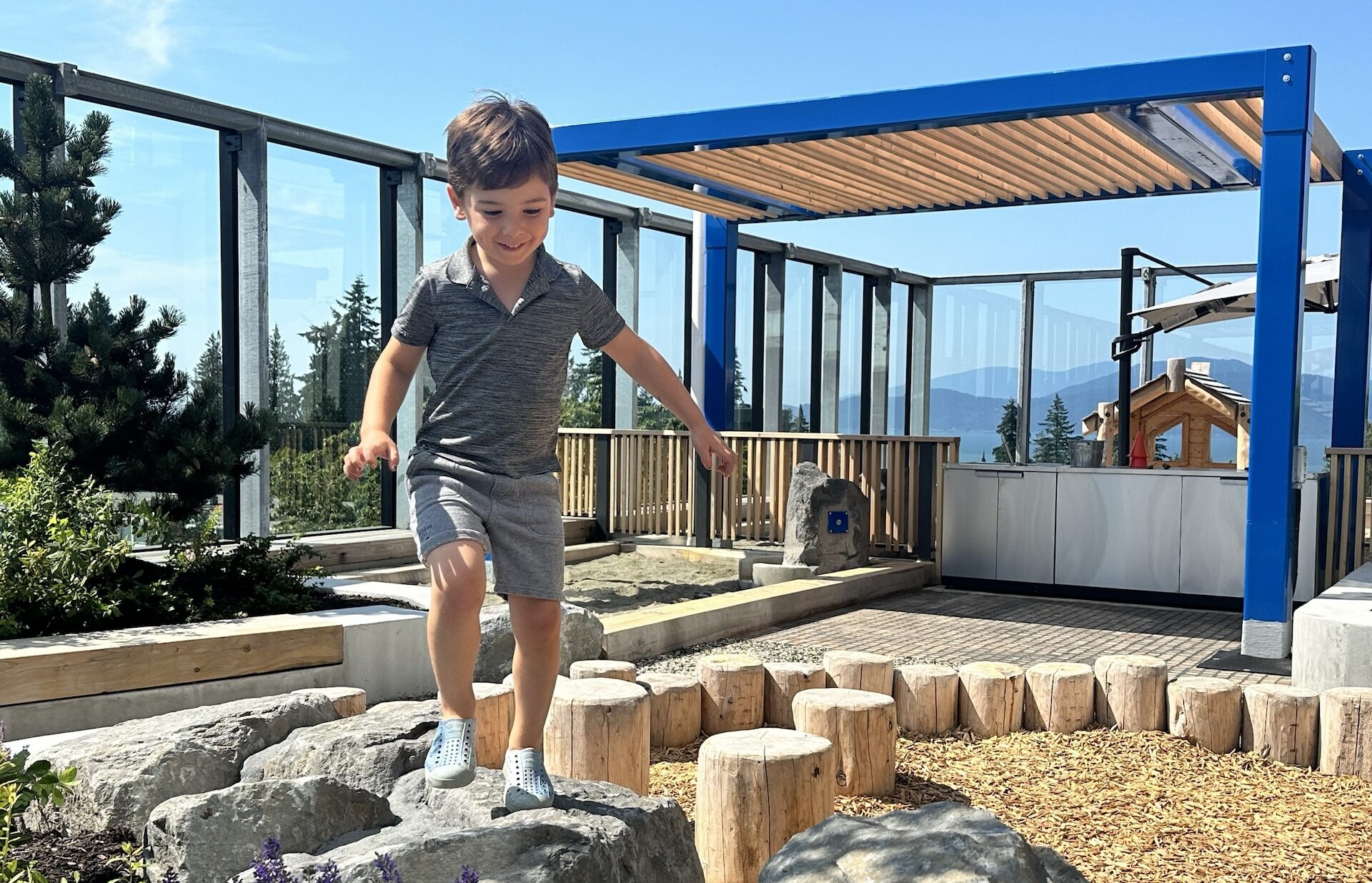As September grows closer, UBC comes alive with the return of thousands of students to campus. While the image of young adults starting the academic year may come to mind, UBC also welcomes over 850 learners who haven’t even started primary school yet!
These children are part of UBC’s renowned child care program, which prioritizes parents and guardians who study, work, teach and research in the campus community. It operates 33 licensed locations across its Vancouver and Okanagan campuses. In fact, UBC is one of Vancouver’s largest child care providers, and stands out as North America’s largest university-operated child care provider.
Bird’s eye view: Heron’s Landing opens its doors
UBC Child Care welcomed the exciting addition of Heron’s Landing child care centre on Aug. 1. It will welcome 12 toddler-age children (12 months to kindergarten) and 25 pre-school-age children (3-5 years old) in two distinct spaces.
Named after the majestic Blue Heron, it symbolizes new beginnings, light through dark, and hope for the next generation. Its location on the fifth floor of the newly opened Brock Commons South building offers a different perspective than the other child care settings on the Vancouver campus, providing spectacular views of the Georgia Strait and coastal mountains from the outdoor play area.
Illuminated with natural light through floor-to-ceiling windows, Heron’s Landing stands tall. New, state-of-the-art amenities are designed to create a nurturing and stimulating environment for young children.
The interior has dedicated art spaces, nap rooms, kitchen and laundry facilities. On the patio, outdoor fans, heat lamps, rain screens and umbrellas are being installed to encourage comfortable play in all seasons.
Perhaps most valuable are the 37 additional child care spaces that this new facility adds in the local community, contributing to UBC Child Cares’ goal of reaching 1,200 total spaces by 2041.
Heron’s Landing was made possible through $2.22 million in funding through the ChildCareBC New Spaces fund, which is jointly supported by provincial investments and federal funding under the 2021-22 to 2025-26 Canada-British Columbia Canada-wide Early Learning and Child Care Agreement.
Quality care within reach
Running such an extensive operation across campus is no small feat. Karen Vaughan, director of UBC Child Care, underscores the complexity and scale of the childcare infrastructure and operations, and how deeply it is appreciated by parents.
“The demand for quality child care is enormous at UBC, as well as across British Columbia and Canada. While we are one of the largest child care providers in the city, we must continue to set ambitious targets to help meet these needs,” said Vaughan.
Offering the ultimate work-life balance to parents and guardians in the UBC community, 40 per cent of child care spaces are allocated to student families, while the remaining spaces are distributed based on enrolment policies and the waitlist.

“We’re so proud to work alongside over 250 educators and staff who are dedicated to providing this quality care while parents in our community focus on their own meaningful studies or work,” said Vaughan. “It is important that young children receive the care and education they deserve at this critical time of their lives. UBC’s early childhood educators work diligently to support the children in acquiring the skills and temperaments they need to be able to engage fully with the complex worlds they are inheriting.”
Melina Biron, research manager in Plant Care Services, is one of many UBC parents who have benefited from child care at UBC. Biron, who is responsible for managing research services for most plant research on campus, is confident that educators are looking after her four-year-old son, Silvano, with the same level of care and precision.
“Having the peace of mind that Silvano is looked after with such outstanding care allows me to dedicate my attention to the millions of dollars in research that we look after,” said Biron.
Almost all UBC Child Care’s full-time settings are eligible for the $10 a Day ChildCareBC program. This means families pay no more than $200 per month per child for full-time enrolment during business hours, on top of other benefits and funding that can be applied for.
For Biron, the impact of the subsidy was significant. “The change to $10-a-day child care provided relief for our family at a time when the cost of everything was rising dramatically. The financial burden of child care was lightened with no impact to the excellent care that we’ve always known here at UBC,” she said.
“I’m grateful for the warmth, creativity, and empathy that these educators provide each child every single day,” she said. “I’ve also enjoyed finding fun ways to give back by facilitating greenhouse tours, and occasionally hosting workshops where children can take the plants they’ve grown back to their centre’s garden for planting.”
Inspiring people, ideas, and actions for a better world
UBC’s vision statement is embodied in UBC Child Care Services’ innovative pedagogy which encourages young students’ engagement with social, cultural and political issues related to justice, the environment, human rights and more.
“Everything in our programs is intentional—from the settings and amenities to our programs and pedagogies,” Vaughan continues, “Often you can see the personal approach of our educators reflected in their settings. For example, one of our educators uses waste, such as snack wrappers, in art projects to encourage deeper discussions around litter, reusing and recycling. Some of our creative projects can even be made in an old school bus that we upcycled and refurbished into an art studio.”
Ena Point, UBC Child Care’s Indigenous relations and engagement pedagogist, works closely with educators to encourage moments of self-reflection, and collaborative spaces to change the status quo of historic ideas, practices and protocols. In turn, educators design ways to weave these teachings alongside our youngest generation, a crucial step on the long road of Indigenous reconciliation.
Point is uniquely suited for this role, which was created for her in 2021. She has lived in Musqueam since she was 18, has worked with urban and remote Indigenous populations, and has experience both as an early childhood educator and as a parent of a child attending UBC Child Care full-time.
“I was hesitant for my youngest to leave his spot at the Musqueam daycare on the Reserve.” Point said. “Making the change to UBC Child Care, I was worried whether he would see himself reflected in the children, educators, and practices. Then, I realized that this was why I was hired—to create these safe spaces where ideas, values and cultural protocols can be respected and honoured.”
Through Point’s work, educators are provided with resources to deepen their own personal understanding of Indigenous issues and inform their educational approach with this subject matter.
“Many of the children in our UBC Child Care Centres can tell you whose land they stand on, what the shoes out front of our building represent, and many of the native plant names in the area. Some of the children can confidently do a land acknowledgement that is accurate to where we stand and even know a few words in hən̓q̓əmin̓əm̓,” says Point.
As these young learners embark on their educational journeys, they do so with the full support of a progressive child care community dedicated to their success. From exceptional educators to state-of-the-art facilities, UBC Child Care provides forward-thinking and affordable early childhood education that lays the groundwork for a brighter, more inclusive future for all.
JOURNALIST RESOURCES
Images for media use: Dropbox








